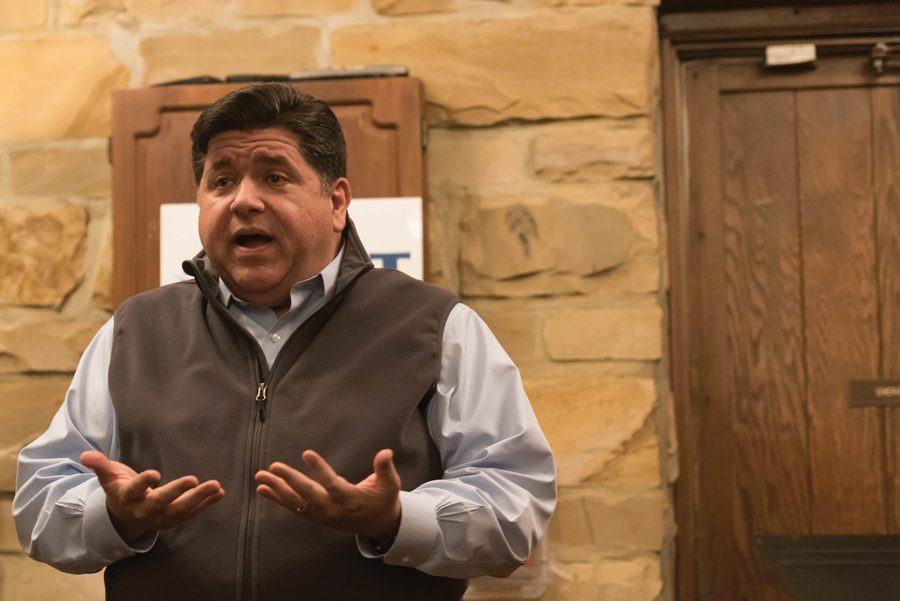Illinois bill seeks to expand financial aid to undocumented and transgender students
Daily file photo by Alison Albelda
House Bill 2691, now passed through the Illinois state senate, would offer state and federal financial aid to transgender students not enrolled in the selective service and undocumented students.
May 31, 2019
A bill passed the Illinois House and Senate that would offer financial aid to undocumented students and transgender students not enrolled in the selective service.
House Bill 2691, known as the Retaining Illinois Students and Equity Act, would also lessen restrictions on Monetary Award Program grants. Around 640 undergraduate students at Northwestern received a MAP grant this academic year, according to the Office of Undergraduate Financial Aid.
Brian Drabik, the senior associate director of the office, estimates around 15 of those students will benefit from the bill.
Weinberg freshman Teresa Vergara Miranda is an undocumented Illinois resident. She said although the bill is “a good step forward,” she predicts it will ultimately benefit students of public universities over private universities. Typically, undocumented students don’t apply for aid through the Free Application for Federal Student Aid, which bars them from federal and state aid, Vergara Miranda said.
“So I never did FAFSA,” Vergara Miranda said. “I had to do the CSS profile because I only applied to private schools because private schools would be the only one that would be able to fund me.”
If a student indicates they’re undocumented when applying to NU, the University waives the FAFSA and asks them to complete the CSS profile instead. If admitted, NU covers demonstrated need for undocumented students through the university’s funds, Drabik said.
Under the new legislation, this process would be altered slightly, according to Drabik. If an undocumented applicant indicates they reside in Illinois, they would then fill out the FAFSA and become eligible for state-funded financial aid. The process is similar for transgender students unable to register for the draft.
“We’re grateful that the state legislature was able to enact this and we hope that this leads to some kind of change on the federal level,” Drabik said. “This could open up the pell grant for undocumented students and perhaps someday eliminate the selective service question or waive it for certain people in certain identities.”
According to Drabik, the most important aspect of the bill for NU is the restructuring of the MAP grant’s restrictions to allow students to apply for more aid. The MAP provides grants to Illinois residents who attend approved Illinois colleges and demonstrate financial need. The University has been utilizing the MAP program since the grant’s inception, Drabik said.
Previously, students could not take over 75 credit hours before their junior year and still be covered by the grant. If a freshman or sophomore needed more paid credit hours after reaching the cap, they would have to attain junior status, forcing students whose MAP grant eligibility ran out in their final quarters to seek aid from other sources. With the bill’s passing, students who meet this cap will be eligible to receive additional funding from the MAP program before their junior year.
Drabik said this impacts any student funded by the MAP grant — and will be especially beneficial for those who come into NU without AP or college credit.
“This legislation is a recognition of the diverse population Northwestern strives to recruit,” Drabik said. “Having the state or a government agency try to support those students sort of aligns with our mission at the university… and the additional support allows use to spend funding on other students as well.”
Cameron Peters, the public relations officer for NU College Democrats, said this legislation comes at a tumultuous political moment where federal protections for transgender and undocumented individuals have been rolled back.
The Medill sophomore said the College Democrats are “glad” to see the bill pass to the Governor’s desk. He added that it’s important for disadvantaged students to be able to access the opportunities higher education provides.
“It’s just incredibly cruel and pointless that (the federal government) is keeping students from getting really important financial aid,” Peters said. “I’m glad to see our state government is taking steps to remedy that.”
Correction: A previous version of this story incorrectly stated Northwestern used Monetary Award Program grants to support previously ineligible students prior to House Bill 2691, and that it would abolish the credit hour cap on MAP grants. Northwestern did not use MAP grants to fund these groups in the past; they used institutional funds to support their demonstrated need, and the new bill would not lift the credit hour cap but instead change administrative rules to allow for students to be eligible to be considered for MAP funds before their junior year. The 135 hour credit cap is still in place.
Additionally, MAP grants are not just available to public colleges but to a variety of approved public, private, and proprietary schools across Illinois. The Daily regrets the errors.
Email: [email protected]
Twitter: @awstinbenavides
Email: [email protected]
Twitter: @Daisy_conant
Related Stories:
– Changes to FAFSA process might squeeze MAP grant applicants, administrators say
– University releases statement following petition to make NU a ‘sanctuary’ for undocumented people


